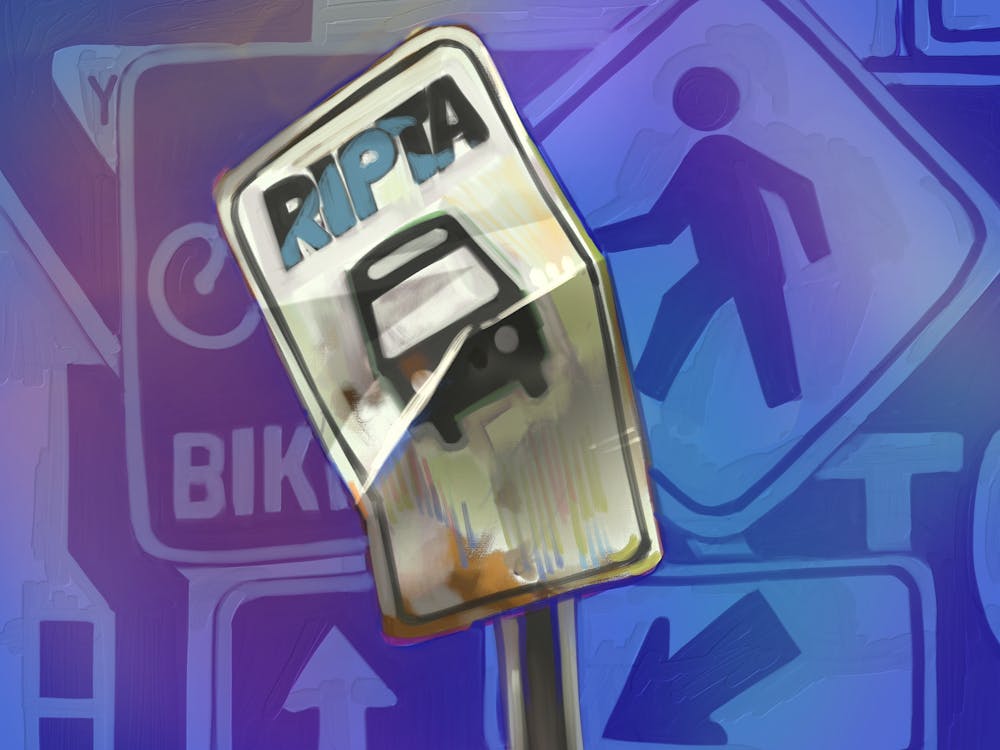When the University first partnered with the Rhode Island Public Transit Authority’s University Pass Program in 2004, Brown students, staff and faculty were able to ride RIPTA buses throughout the state at half-price. In 2007, the policy was updated so that the Brown community could ride RIPTA free of charge — just by swiping their Brown ID.
Today, eight other Rhode Island colleges and universities also participate in the U-PASS program, which, at Brown, “ensures that all students, faculty and staff have access to reliable public transportation without concern over cost,” said Carleia Lighty, the University’s director of transportation and Brown Card Services.
U-PASS benefits vary from school to school, with some — like Johnson and Wales University — offering discounted rates to certain students.
In the 2024 academic year, members of the Brown community took over 230,000 RIPTA rides, according to Lighty. Of these riders, 54% were students, 29% were staff and 17% were faculty members.
Each college or university in the U-PASS program pays RIPTA in accordance with the amount of their students and faculty who ride RIPTA each year, according to Sara Furbush, a RIPTA spokesperson. She added that Brown pays approximately $313,000 annually for RIPTA rides that University students, faculty and staff take.
Brown’s contribution accounted for around 45% of the more than $690,000 in total collections received by the U-PASS program in the 2024 fiscal year, Furbush added. Total collections from the U-PASS program amount to about 0.5% of RIPTA’s total annual budget, according to Furbush.
“While the cost of participation has increased over time, the University continues to support the program to ensure students, faculty and staff have access to public transit,” Lighty wrote.
Besides during the COVID-19 pandemic, Brown has generally had the largest overall RIPTA ridership numbers across participating colleges and universities in the state. But ridership among the Brown and RISD communities have yet to return to pre-pandemic levels, RIPTA data shows.
According to data from The Herald’s fall 2023 poll, 11.5% of students take RIPTA a few times a month, 21.7% ride it a few times a semester and 29.2% have never used it.
“U-PASS has allowed me the freedom to go where I want and need to in a financially economical way,” said Kalie Minor ’27, adding that she typically rides RIPTA every two to three weeks. Minor has used RIPTA to reach the Roger Williams Zoo and other locations in Providence, and even across state lines to the Target in Seekonk, Massachusetts.
R.I. resident Benjamin Rozea ’27 said he takes RIPTA every other week, largely to travel from campus to home.
“I use the RIPTA anywhere between twice to five times a month,” said Paul Hyman ’27. He uses RIPTA for grocery shopping and occasional trips to further destinations, like Barrington.
All three students agreed that Brown should continue funding the U-PASS program.
For Minor, the U-PASS program represents part of Brown’s effort to recognize that not all students come from a wealthy background. When considering other transit options like rideshares or rental cars, Minor said that “RIPTA is the choice I have made ten times to one, and that is because it is free.”
According to The Herald’s fall 2023 poll data, 11% of respondents receiving grants covering all costs indicated that they took RIPTA weekly, versus the 6% of students receiving no financial aid and the 7% of students receiving grants covering some costs who reported the same.
“The U-PASS program is an imperative link between the university community — already economically, geographically and socially isolated — and the larger Providence community,” Rozea added.
Lighty said the U-PASS program also “plays a crucial role in supporting campus accessibility and sustainability initiatives by reducing reliance on personal vehicles and promoting green commuting options.”
But some students complain that RIPTA is frequently delayed, and bus schedules are unreliable.
“I’ve had many scenarios where a bus I’ve been waiting on will pass me at my stop or will be over 15 minutes late,” Hyman said, adding that they’d be more inclined to use RIPTA “if the buses were more timely and frequent.”
“We’re actively looking at ways to enhance frequency and reliability across the system,” Furbush said, pointing to recent initiatives such as schedule adjustments, tracking technology and programs to fill service gaps.
RIPTA is currently facing a $32.6 million budget deficit for fiscal year 2026, The Herald previously reported. If the deficit cannot be closed, riders can expect a 25% reduction in fixed-route services, Furbush wrote, adding that the agency will also have to re-evaluate fare prices. She did not say whether Brown and its affiliation with RIPTA would specifically be impacted if these changes occurred.
If RIPTA services near campus were to be reduced, Rozea said that it “will impact the capacity for Brown students to get off campus and around the state.”
Pavani Durbhakula is a senior staff writer and photographer. She is a first-year from DC and plans to study IAPA and Public Health. In her free time, she enjoys baking, reading, and searching for new coffee shops.





